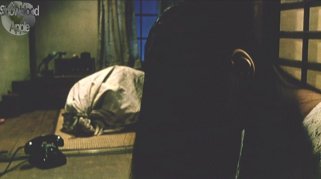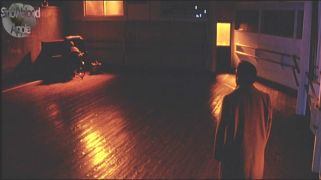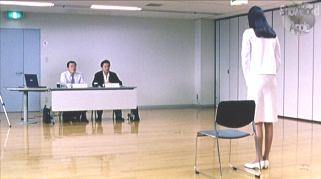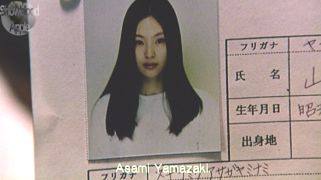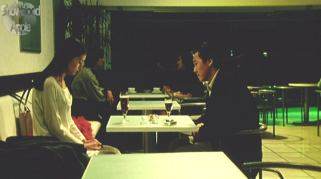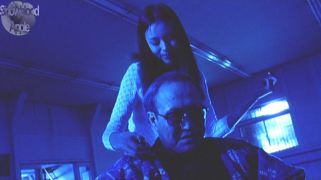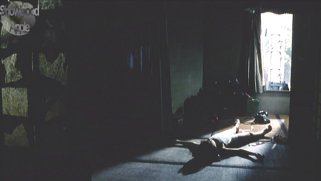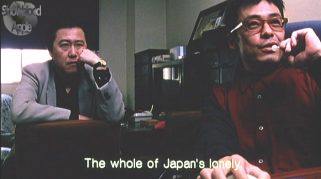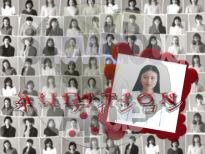
(aka
Odishon) |
|||||||||||||||||
|
Directed by Takashi Miike, 115 min. starring Ryo Ishibashi, Eihi Shiina,
Tetsu Sawaki, Jun Kunimura, Ren Osugi, Renji Ishibashi, Miyuki Matsuda,
Toshie Negishi, Shigeru Saiki, Ken Mitsuishi, Yuriko Hirooka, Fumiyo
Kohinata, Misato Nakamura.
We all love a good old-fashioned traditional romance tale, don’t we? You know the kind of thing I mean… boy meets girl, boy dates girl, boy discovers girl’s shady secrets, girl turns into psychotic S & M torturer… <sniff> brings tears to your eyes, doesn’t it? Well, the last half-hour of Audition will certainly bring tears to your eyes… my mom always said you should watch out for the quiet ones ;-) Welcome to what is perhaps the least extreme of Takashi Miike’s films and the one that truly cemented his reputation outside Japan as being one of the most extreme directors in the world, Audition (or to give it its proper Japanese title, Odishon); a film with such a horrifying final half-hour that it holds the dubious honour of having had the most audience walk-outs of all time during its premiere.
And yet for all the hype concerning the violence within the film, Audition is not merely a simple horror-gore flick; in fact, the gore rating is considerably less than in such other Miike films as Ichi The Killer (aka Koroshiya no. 1) or Dead Or Alive. Despite Miike’s own denial of the film having any other purpose than just being an extreme piece of cinema, Audition works on many levels: the first three-quarters of the film is part blackly comic and satirical love story, part damning social indictment, and IMHO, terribly, terribly dull. Miike said in interviews at the time of its release that he purposely intended that the story’s build-up should be painfully slow and incredibly boring so as to increase the shock/horror value of the final scenes. As clever an intention as that might be, unfortunately for my tastes it almost renders a third or fourth watching of the film unbearable. However, that said, Audition is a remarkable film experiment, and one full of profoundly black messages; that dating is a dangerous business; that women in Japan have to debase themselves and lose their dignity in order to get anywhere within such a male-dominated society; that the Japanese in particular work far too hard and try to take shortcuts in their social lives; and even as one of the characters in the film, Yoshikawa, states bluntly during a whole speech about the decline of Japanese civilisation, “The whole of Japan is lonely”, implying perhaps that too much time is wasted by Japanese men worrying about their careers and not about their personal happiness.
Synopsis The story resumes seven years after the death of Ryoko, and it’s obvious that Aoyama and his son have grown very close to each other as a result. Shigehiko is now attending high school and dating girls, and one night over dinner, he tells his father that he’s looking old, and that he should re-marry. His father becomes very interested in the idea, but as he’s a businessman who doesn’t even stop working when he’s at home, he doesn’t think he’ll be able to find a date, let alone a wife. One night, whilst he’s out at a swishy businessman’s club with his best friend Yoshikawa (played by Jun Kunimura), the two men get talking about how hard it is to find romance nowadays with long working hours and the so-say “lack of decent young women” in Japan. Yoshikawa tells Aoyama that most young Japanese women are unhappy because they aren’t confident in themselves, and that ‘traditionally trained’ girls, ie ones with dance or musical training, are more like to make happy and stable wives.
Out of this conversation comes a rather outlandish suggestion from Yoshikawa combining the two major aspects of Aoyama’s concern – remarriage and career - by telling his friend he should hold an audition, whereby he could invite 30 young women with classical training to come and try out for the lead rôle in a possible film. That way, Aoyama could choose a date from among them, and if Yoshikawa can get sponsorship for the film, there would also be more work for his company. Reluctantly,
although intrigued by the weird idea, Aoyama agrees, and between
them they set up the audition, via radio announcements and adverts
in the Tokyo newspapers. However, whilst Aoyama is sifting through
the piles of application forms he receives from the hopefuls, he
finds one among them which really catches his interest, from an
attractive and mysterious ex-ballerina named Yamazaki Asami (Eihi
Shiina in her first film role), who wrote a bizarre essay on the
back of her form about the nature of death and how difficult it
was for her to remain hopeful and not despair after an “accident”,
which damaged her hip as a teenager, ended her ballet career. For
some totally inexplicable reason, presumably because it
echoes his own sadness at the loss of his wife, Aoyama is drawn
to Asami even before the audition takes place. Of course, one thing leads to another, and Aoyama begins cautiously to date Asami… but Yoshikawa has a bad feeling about her, which he confides to his friend after he discovers that all the references Asami gave at her audition were fake. And as Aoyama and Asami get closer, he begins to find out little by little the strange, dark secrets of Asami’s life by chasing up the fake references she gave him at the audition. But he could never have foreseen what was about to happen to him…
Audition is a disquieting tale of obsession and madness; Aoyama’s obsession with finding a perfect new wife and his ensuing new obsession with the person he believes would fit the rôle; and Asami’s obsession with her tragic and abusive past, which drives her to psychosis, utter insecurity and lunacy. In many ways, Audition delves deeply into the complex psychological correlations between abuse, sadism, insecurity and psychotic behaviour; one of Asami’s nastier fetishes calls to mind the actions of the equally loopy Annie in Stephen King’s Misery, maiming and disabling the writer so that he would be forced to depend on her completely; Asami even says throughout the film, “You love only me, don’t you?” which echoes that sentiment completely. Add to that the fact that Asami’s stepfather gets off on causing pain and damage to her, and that the cycle of abuse has continued down through to her, a pattern of behaviour which is well-known in psychiatric theory; it’s not merely an act of revenge, it’s a learned behaviour. Asami, like all good sadists, genuinely enjoys causing agony to others, while simultaneously believing in all truth that somehow she’s doing her victims a favour, so that they can learn more about themselves from experiencing the kind of pain she received through her childhood. Again, the protagonist in Misery also tells the trapped and maimed writer that she's doing him a favour by forcing him to write what would be 'his best book ever'; there is a strong parallel between the two films - both feature crazy and sadistic female anti-heroines who display the same kind of psychoses for the same kind of reasons. Also, as some people have pointed out, Audition's central theme is a very pertinent and relevant social story; yes, in the very worst case scenario, it could happen to you. Whilst some parts of the film are surreal, the threats are very real. Everyone knows how dangerous it can be to date someone you don’t know very well; thousands of murders and disappearances every year bear a chilling testament to this. Blind dates can turn nasty and end up in date-rape; dating agencies recommend that people should meet up in public places during the daytime to avoid any threat of danger; and even e-mails aren’t safe, such as in the legendary (though actually true) Net case of the self-titled “Slavemaster”, who used mail messenger programs to meet women, who he later tortured and maimed for pleasure. As Midnight Eye pointed out in their review, it’s a profoundly depressing thought that this kind of thing does take place in the ‘real world’ outside of the cinema.
However, there are one or two slightly questionable plot holes in Audition. As one person on a Japanese horror-movie forum pointed out, why on earth would anyone choose to date Asami, the anti-heroine, when she demonstrates, and I quote, “… all the personality of a head cold”? And why on earth would Asami want to date Aoyama, which is a slightly risible prospect, considering his age and not particularly high-status career? Some of the story seems a little under-developed at points. The cinematography is, as you would expect from Miike, very elegant and classy – in fact, the first portion of the film looks as if it might have been made for one of those expensive coffee commercials on TV – and even the violence is almost understated, featuring none of the buckets o’ guts featured in, say, Guinea Pig or Evil Dead Trap. Whatever
you choose to read into Audition, whether it be bleak social
commentary and a wake-up call for the naive plus-40 generation,
modern ultra-feminist fable, complex psychological exploration or
just good old-fashioned gore lust, it is definitely a must-see-at-least-once
film. Snowblood
Apple Rating for this film: |
|||||||||||||||||
|
text,
webdesign (c) 2002 M. Apple. All characters, situations and images
remain the property of their respective owners. The
text and webdesign of this site may not be copied, reproduced, mirrored,
printed commercially or ripped off in any other way. Do not hotlink
directly to images hosted on this site.
|
|||||||||||||||||

